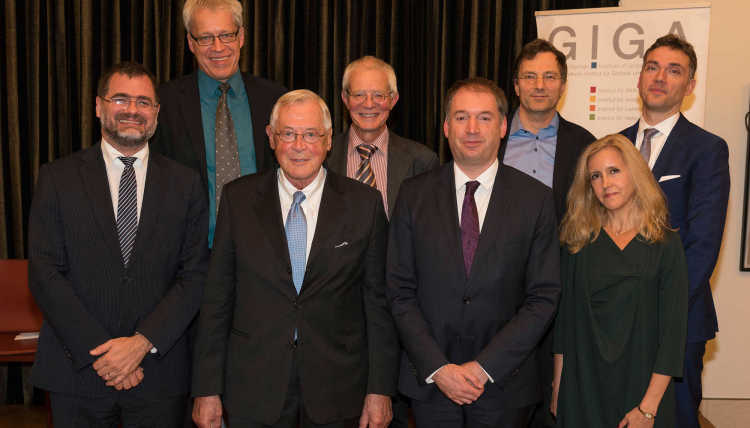Event | 20/10/2016
“Democracy isn’t an export commodity that can simply be shipped abroad”
GIGA scholars examine the diverse notions of democracy competing around the globe at an event in Berlin.

“Democracy isn’t an export commodity that can simply be shipped abroad. Democracy draws from various sources, has various actors and values, and is above all often an arduous process.” With these words, Prof. Bert Hoffmann, senior research fellow and head of the GIGA Berlin Office, opened the panel discussion “Because They Matter – Global Prospects for Democracy” at the beginning of October at Hamburg’s State Representation to the Federation in Berlin.
For years researchers and observers have been grappling with the question of why hopes for the worldwide implementation and expansion of democratic ideas repeatedly appear to be crushed. The world, according to moderator Dr. Theo Sommer, is described as “connected, contested, and complex.” “We’re living today between two world orders – in a period of considerable disorder in the world. A period that will likely last several decades,” said the long-time publisher and editor-in-chief of the weekly newspaper DIE ZEIT.
“What the West frequently sets as the norm is actually only a portion of the world,” said Bert Hoffmann. “At the GIGA we are interested in seeing the world from other perspectives – above all those beyond the Western industrialised states.” This aim, he noted, stems from a global understanding of scholarship, as recently outlined by GIGA president Prof. Amrita Narlikar.
Roughly 60 diplomats, members of parliament, NGO representatives, and journalists accepted the invitation from the GIGA and the Hamburg Senate and attended the event at Hamburg’s Representation in Berlin. At the event, Bert Hoffmann and other GIGA scholars shed light on how the different views of democracy are increasingly competing with the classical Western model. Niels Annen, the foreign affairs spokesperson for the SPD’s Bundestag delegation, explained the consequences of this for political practice.
“No regime can get around democracy” China expert Dr. Günther Schucher described how China’s leadership is attempting to influence the global discourse on democracy. While highlighting the weaknesses of the Western liberal system, it presents China as the “largest democracy in the world.” This is because in the view of the Chinese, democracy doesn’t mean “free elections” – democracy means “doing what is good for the people.” This understanding, according to the GIGA researcher, is also shared by the majority of Chinese citizens. At the same time, he pointed out, this shows “that no regime in the world can get around democracy.”
Dr. Mariana Llanos, who leads the Accountability and Participation Research Programme at the GIGA, presented a comprehensive picture of the multifaceted development of democracy in Latin America. Among other things, she outlined the diverse causes of the current crises in Brazil and Venezuela and the attempts at resolution that can be observed.
“The hopes for democracy have not been fulfilled,” said GIGA Middle East researcher Dr. Stephan Rosiny in reference to the Arab Spring. But, he added, democracy based on the Western example was never a central demand of the various movements – this was a misconception. “When those involved insist on the formal mechanisms of Western democracy, it often leads to resentment. Institutional power-sharing arrangements between different groups can be an important approach in finding political solutions.”
Based on an analysis of current survey data from Afrobarometer, Dr. Christian von Soest, an Africa expert and the head of the GIGA Peace and Security Research Programme, assessed democratisation processes in Africa. The current crises and conflicts – for example, in Burundi – should not obscure the fact that there is growing citizen support for democratic principles. “The West cannot and should not try to exert control,” he said. “But it can support such developments.”
GIGA’s Expertise in Demand The observation that many of the current crises and conflicts around the world are shaped by misunderstandings was at the centre of the panel discussion. “When we talk to our partners in the Middle East, the message we receive is often a different one. This becomes particularly clear in questions of democracy,” said Niels Annen. He pointed out that the GIGA’s comparative regional research is essential in remedying this.
Wolfgang Schmidt, Hamburg’s plenipotentiary to the German Federation, who is also in charge of international affairs, highlighted GIGA’s special importance as “an institute that conducts its work not just on but also with the regions Africa, Asia, Latin America, and the Middle East.” The GIGA’s expertise on global topics such as global governance, peace and security, power, ideas, and participation is in demand both in the Hanseatic City and within the federal government in Berlin, and also with respect to the G20 summit in Hamburg in 2017. “In the lead-up to the G20 summit and beyond, we will be discussing many of the topics that the GIGA deals with in its research,” said State Secretary Schmidt.
Read on
Amrita Narlikar "Because They Matter": Recognise Diversity—Globalise Research GIGA Focus Global, 01/2016
Heike Holbig / Günter Schucher "He who says C must say D" — China’s Attempt to Become the "World’s Largest Democracy" GIGA Focus Asia, 02/2016
Mariana Llanos / Detlef Nolte The Many Faces of Latin American Presidentialism GIGA Focus Latin America, 01/2016
Stephan Rosiny / Thomas Richter The Arab Spring: Misconceptions and Prospects GIGA Focus Middle East, 04/2016